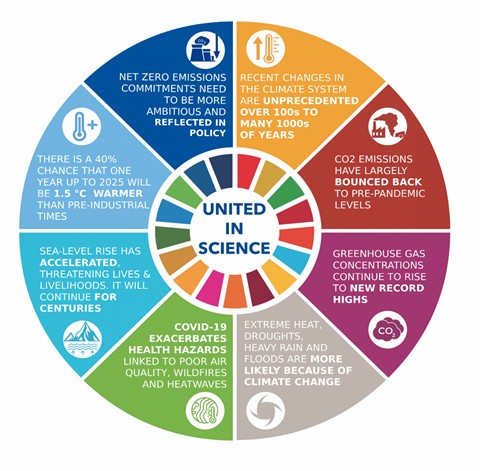United in Science 2021 Stimulates for Net Zero Emissions Commitments
On September, 2021, UN agencies reported the latest climate science report which obviously presented that since the COVID-19 pandemic, the world has not been growing back greener. After a temporary drop, CO2 emissions are rapidly increasing and atmospheric greenhouse gas concentrations are in the new record highs. The global mean surface temperature for the period from 2017–2021 is among the warmest on record, estimated at 1.06 to 1.26 °C above pre-industrial levels. As evidences in the Figure 1, human is facing changes of climate system which are unprecedented over 100s to many 1,000s of years. We are now facing the highest on record of the average global temperature for the past five years and in the next five years, the temperature threshold of 1.5 °C could be hit with a chance of 40%. As a result, disasters including extreme heat, droughts, heavy rain and floods are more likely which would affect lives and livelihoods for centuries.
For more evidences of natural disasters, recent flood in Burundi caused more than 100,000 people to flee their home and flood in South Yorkshire, United Kingdom hit more than 190 buildings. Within weeks, the US mainland was hit by 2 storms including Hurricane Ida which killed dozens and caused more than a million Louisiana residents without power and Tropical storm Nicholas in Texas and Louisiana caused more than 500,000 power outages. Heatwaves in in Lytton, Canada caused a recording Canada’s highest-ever temperature of 49.6 °C (121.3 F) and wildfires.
Five years after the adoption of the Paris Agreement, the emissions gap is as large as ever: global emissions need to be 15 GtCO2e lower than current unconditional Nationally Determined Contributions (NDCs) imply for a 2 °C goal, and 32 GtCO2e lower for the 1.5 °C goal.
According to the UN Secretary-General António Guterres, the world is significantly off-schedule to meet the goals of the Paris Agreement. Limiting global warming to 1.5 °C would be impossible and we depend on the catastrophic consequences unless there are immediate, rapid and large-scale reductions in greenhouse gas emissions. For the above reasons, net zero emissions commitments must be more ambitious and reflected in policy.
Reference:
- https://unfccc.int/news/un-agencies-present-latest-climate-science
- https://www.bbc.com/news/world-us-canada-58549880
- https://www.bbc.com/news/world-us-canada-58555227
- https://www.bbc.com/news/uk-england-south-yorkshire-58616549
- https://www.bbc.com/news/world-africa-58614677
Writers: Issara Poljungreed and Apaphatch Hunsiritrakun
Capacity Building and Outreach Office
Thailand Greenhouse Gas Management Organization (Public Organization)
Ministry of Natural Resources and Environment


